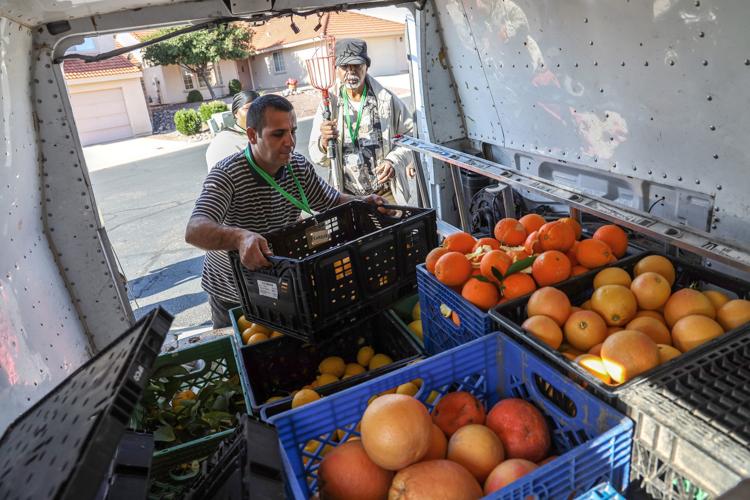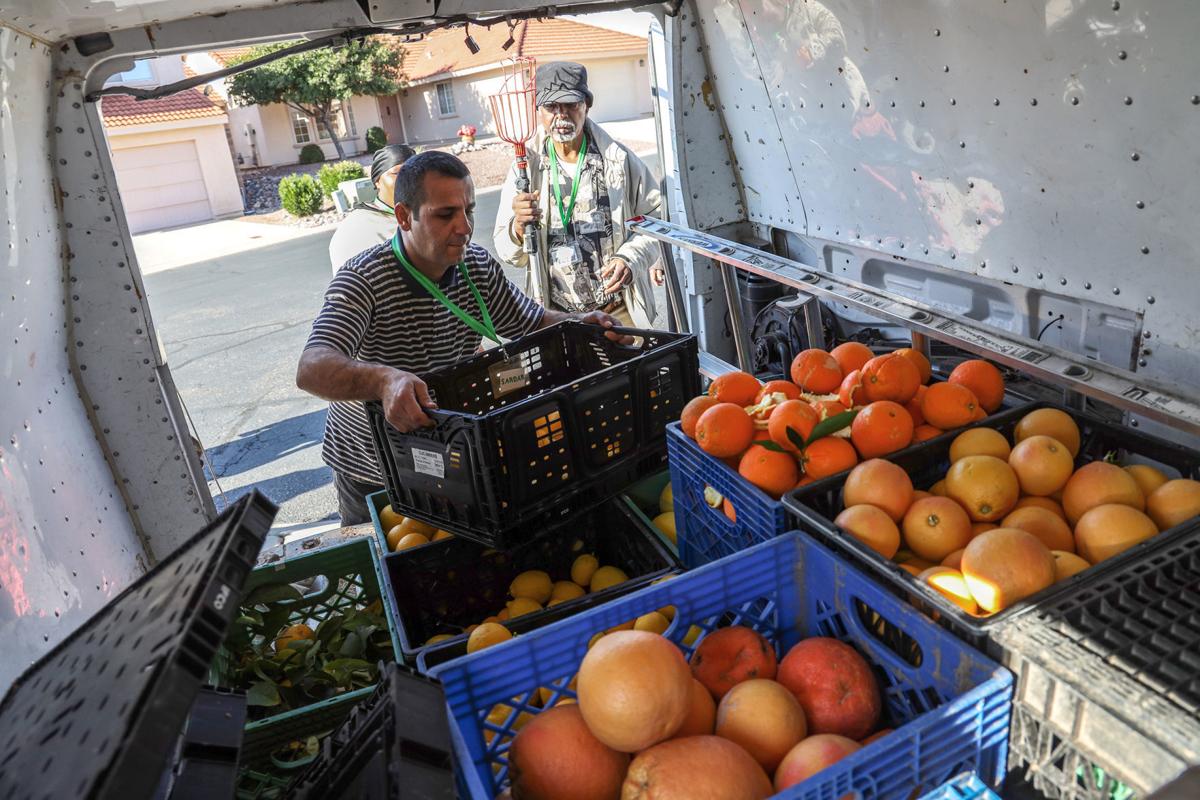There’s a fridge on a patio, somewhere off Grant Road, that is full of wonder: tangerine juice, whole lemons preserved in brine, Rwandan grapefruit marmalade, pomelo fruit punch sweetened with grape juice, some Marmite-colored paste made out of lemon juice called amilo. While the juices are concoctions borne out of whatever Iskashitaa Refugee Network has been harvesting lately, the preserves reflect precious food knowledge brought from abroad.
Iskashitaa reduces Tucson’s food waste by over 100,000 pounds each year. Finding a use for and feeding Tucson with fruits from ornamental trees across town is a huge part of the nonprofit’s mission, but it isn’t the only point. Equally crucial is building a mutual connection between refugees and the community they have joined.
If you have citrus trees in your neighborhood, you might have noticed that this time of year, late winter, is when fruits like meyer lemons and grapefruits are falling from trees and rotting on the ground. This is prime time for Iskashitaa, which has a limited window to glean all varieties of citrus from trees before they go to waste.
“It takes heaven and earth to move 5,000 pounds of citrus every week,” said Barbara Eiswerth, the founder and director of Iskashitaa. “Sixty percent of what we harvest goes to shelters and soup kitchens. Thirty percent goes to refugee families directly, and 5 to 10% we use to locally source for restaurants or for internal use. For our marmalade making, or our juice.”
The gleaning used to completely go to refugee families when Iskashitaa started 18 years ago, but as the organization has grown, Iskashitaa harvests more fruit than can be taken by hand on the buses refugees most often use as transportation. But refugees take as much as they want and are able to, and they use it to recreate foodways from the countries they had to leave behind.
Amilo is a Bhutanese ingredient used in chutneys and pickles. Its bitter-sour potency is distilled from the juice of hundreds of lemons. Barbara offered me only the tip of a knife’s edge to taste. The jar in the fridge was made by a refugee from Bhutan. The refugee had lived in Tucson for 10 years yet joined Iskashitaa only a few months ago, when she was in search of the large volume of lemons needed to concentrate amilo. A friend of hers connected her to the refugee network, which has hundreds of lemons to spare for such culturally significant work.
Iskashitaa has worked with 44 different ethnic groups of refugees over its 18 years. The network gleans all sorts of fruits, nuts, vegetables and edible weeds from Tucson. “[We have] an ever-increasing understanding of the wealth of knowledge and resources in people’s backyards and refugee’s homes,” Barbara said.

Roberta Elliott, left, a refugee activist from M’Kor Hyim Synagogue, and Mounis Hammouda, a refugee from Gaza, harvest citrus.
The dishes and preserves that are brought back to Iskashitaa are a testament to the reciprocal mission at Iskashitaa: that integrating refugees is a process that benefits both incoming and established communities in profound ways.
“From A to Z, [refugees have] taught us as a network so much about pickling, fermenting, and preservation, using methods I didn’t have any access to as an American,” Barbara said. She explained that people from other parts of the world see Tucson’s ornamental trees with different eyes, attuned to cuisines that make bold flavors without favorite American seasonings like sugar and salt.
“There’s preserved or pickled lemons that are a North African tradition — you take lemons and preserve them in other lemon’s juice. Lemon juice and salt and nothing else,” Barbara said. “There’s a whole club of foodies who are addicted to them. It’s different than anything else. You can use it in your yogurt, a spinach salad, a pasta salad. You’re using the whole lemon, so you’re eating the antioxidants in the skin you otherwise wouldn’t be eating.”
If you want to try these pickled lemons, Iskashitaa is working on a way to store them: the highly corrosive citric acid makes traditional metal-lidded canning untenable. But if you’re interested in trying the North African specialty, Barbara said, come to her. The fridge at Iskashitaa’s headquarters, at 1406 E. Grant Road, is the gateway to flavors across the world.
“Sour oranges, for instance, are an integral part of Iraqi foodways — they would pick a Seville orange over any other kind of citrus,” said Barbara. “They say that’s the secret ingredient in tabbouleh, fattouq, doulmas, all that kind of stuff. It literally gets lost in translation.
“You can’t find it at farmers markets or grocery stores. You get them at Iskashitaa,” she said.
Iskashitaa will be selling food products made with gleaned produce at the Desert Air Market, this Saturday, March 19, at Bhava Wellness, 439 N. Sixth Street, from 10 a.m. to 4 p.m. For more information, check out this Instagram post.
If you’re interested in volunteering with Iskashitaa, learn more at their website.






